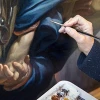10 careers found.
Museum attendants work in the public spaces of museums, greeting visitors and attending to enquiries, and ensuring the protection of exhibits.
Museum curators look after, manage, organise, display and develop museum collections, and conduct related research. Museum curators usually specialise in a broad discipline, such as anthropology, art, decorative arts, natural history, social history, science or technology. Within that discipline they are generally recognised as authorities on one or more specific subject areas.
Museum officers prepare specimens for collections, and construct and arrange museum and art gallery exhibits.
Archivists analyse and document records. They also plan and perform procedures for the safekeeping of records and historically valuable documents. This may include working closely with written records, files, maps, plans, letters, books, certificates, diaries and registers. Records also include other media such as photographs, films, sound recordings, microfilms and electronic or computer records.
Conservators plan, organise and undertake the preservation and conservation of materials and objects in private, public and community collections, including libraries, archives, museums, art galleries, art centres, and historical and archaeological sites. Conservators specialise in a range of areas, including paper, paintings, photographs, social and cultural artefacts, bookbinding and archives, furniture, archaeological materials, buildings and historic sites, outdoor sculpture and large technology objects, textiles and preventative conservation.
Health information managers combine knowledge of healthcare processes, health records and administration, information management and human resource management to provide services that meet the medical, legal, ethical and administrative requirements of the healthcare system.
Public education officers design and deliver specialised education programs to educate school or community groups on different issues or run education programs for institutions such as museums, zoos or art galleries.
Records officers are responsible for the creation, storage, retrieval and disposal of all recorded information about an organisation's activities. Information can come in many formats, such as digital, photographic, film or paper. This information contributes to what is often called the 'corporate memory' of the organisation, without which an organisation could not function properly or be held accountable for its actions.
Taxidermists prepare skins of birds, mammals, reptiles and fish to create life-like 3-D representations for display in museums, or as trophies and memorials. The skin (including fur, feathers or scales) is removed from the specimen, preserved using various methods, and mounted on an artificial frame. Taxidermists in museums also prepare specimens for study, research and collection purposes. They may employ the technique of skeletal assembly to demonstrate the structural and anatomical features of a specimen.
Tour guides accompany visitors on local tours and guide tourists within a specific country, region, area, city or site. They provide special information on history, archaeology, monuments and works of art, the environment, culture, natural and built attractions, places of interest, and any general matters of interest to the visitor.






